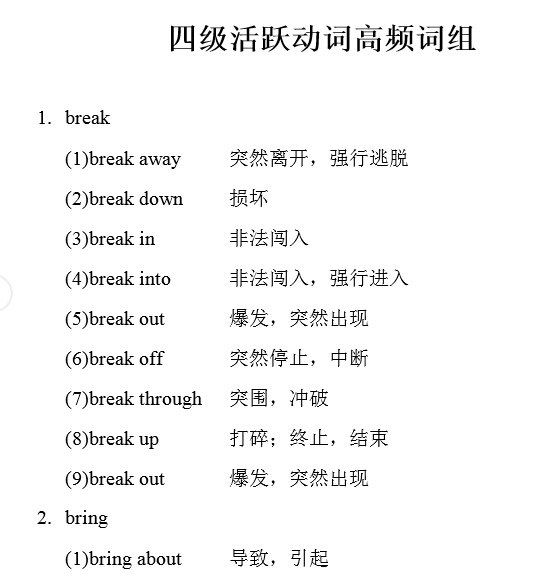过去完成时用英语怎么说
的有关信息介绍如下:
过去完成时(past perfect)表示在过去某一时间或动作之前已经发生或完成了的动作或状态。 它表示句子中描述的动作发生在“过去的过去”。基本结构主语+had+过去分词vpp.(done)①肯定句:主语+had+过去分词.②否定句:主语+had+not+过去分词.③一般疑问句:Had+主语+过去分词?肯定回答:Yes,主语+had.否定回答:No,主语+had not .④特殊疑问句:特殊疑问词或词组+一般疑问句(Had+主语+过去分词)?基本用法表示在过去某一时刻或动作以前完成了的动作,也可以说过去的时间关于过去的动作。即“过去的过去”。可以用by, before等介词短语或一个时间状语从句来表示,也可以用一个表示过去的动作来表示,还可能通过上下文来表示。例如: By nine o’clock last night, we had got 200 pictures from the spaceship. 到昨晚9点钟,我们已经收到200 张飞船发来的图片。过去完成时-语法判定1. 由时间状语来判定一般说来,各种时态都有特定的时间状语。与过去完成时连用的时间状语有:( 1 ) by + 过去的时间点。如:I had finished reading the novel by nine o'clock last night.( 2 ) by the end of + 过去的时间点。如:We had learned over two thousand English words by the end of last term.( 3 ) before + 过去的时间点。如:They had planted six hundred trees before last Wednesday.2. 由“过去的过去”来判定。过去完成时表示“过去的过去”,是指过去某一动作之前已经发生或完成的动作,即动作有先后关系,动作在前的用过去完成时,在后的用一般过去时。这种用法常出现在:( 1 )宾语从句中当宾语从句的主句为一般过去时,且从句的动作先于主句的动作时,从句要用过去完成时。在told, said, knew, heard, thought等动词后的宾语从句。如:She said that she had seen the film before.( 2 )状语从句中在时间、条件、原因、方式等状语从句中,主、从句的动作发生有先后关系,动作在前的,要用过去完成时,动作在后的要用一般过去时。如:After he had finished his homework, he went to bed.注意: before, after 引导的时间状语从句中,由于 before 和 after 本身已表达了动作的先后关系,若主、从句表示的动作紧密相连,则主、从句都用一般过去时。如:After he closed the door, he left the classroom.(3)表示意向的动词,如hope, wish, expect, think, intend, mean, suppose等,用过去完成时表示"原本…,未能…"We had hoped that you would come, but you didn't.3. 根据上、下文来判定。I met Wang Tao in the street yesterday. We hadn't seen each other since he went to Beijing.过去完成时-语法区别一、 过去完成时与现在完成时的区别现在完成时表示的动作发生在过去,以现在的时间为基点,但侧重对现在产生的结果或造成的影响,与现在有关,其结构为“助动词 have (has) + 过去分词”;过去完成时则是一个相对的时态,以过去时间为基点,它所表示的动作不仅发生在过去,更强调“过去的过去”,只有和过去某时或某动作相比较时,才用到它。比较:I have learned 1000 English words so far.到目前为止我已经学会了 1000 个英语单词。I had learned 1000 English words till then.到那时为止我已经学会了 1000 个英语单词。— I'm sorry to keep you waiting. 对不起,让你久等了。— Oh, not at all. I have been here only a few minutes.没什么,我只等了几分钟。(“等”的动作从过去某一时间点持续到现在)二、过去完成时与一般过去时的区别虽然这两种时态都表示过去发生的动作或存在的状态,但在使用时应注意以下几点: 1. 时间状语不同:过去完成时在时间上强调“过去的过去”;而一般过去时只强调过去某一特定的时间。比较:They had arrived at the station by ten yesterday.They arrived at the station at ten yesterday.2. 在没有明确的过去时间状语作标志时,谓语动词动作发生的时间先后须依据上下文来判断:先发生的用过去完成时,后发生的则用一般过去时。She was very happy. Her whole family were pleased with her, too. She had just won the first in the composition competition.3. 当两个或两个以上接连发生的动作用 and 或 but 连接时,按时间顺序,只需用一般过去时来代替过去完成时;另外,在 before , after , as soon as 引导的从句中,由于这些连词本身已经表示出时间的先后,因此也可以用过去时来代替过去完成时。He entered the room, turned on the light and read an evening paper.



